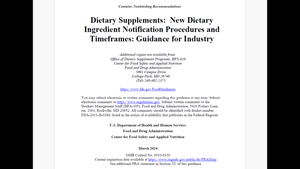FDA, FTC target infertility supplements
More than a year after being asked by a consumer advocacy group to take enforcement action against manufacturers of fertility supplements, FDA and FTC warned five companies in letters that their products are intended to treat diseases.

U.S. regulators on Wednesday announced sending warning letters to five companies for making unlawful claims that their dietary supplements cure, treat, mitigate or prevent infertility and other reproductive health disorders.
Such products intended to treat disease are considered drugs under the Federal Food, Drug & Cosmetic Act, even if they are labeled as dietary supplements, according to an FDA news release announcing the warning letters.
FDA said it has not evaluated whether the products subject to the warning letters are effective for their intended use. The agency added it has not evaluated the products’ proper dosage, how they could interact with FDA-approved drugs or other substances, or whether they have dangerous side effects or other safety concerns.
“Dietary supplements that claim to cure, treat or prevent infertility and other reproductive health conditions can potentially harm consumers who use these products instead of seeking effective treatments, such as FDA-approved drugs or assisted reproductive technology,” said Judy McMeekin, FDA’s associate commissioner for regulatory affairs, in a statement. “Protecting the health and safety of Americans is the FDA’s highest priority, and we will remain vigilant in warnings about products and companies that place consumers at risk.”
FDA and FTC, which polices deceptive or fraudulent advertising practices, sent the letters to LeRoche Benicoeur/ConceiveEasy, EU Natural Inc., Fertility Nutraceuticals LLC, SAL NATURE LLC/FertilHerb and NS Products, Inc.
EU Natural plans to respond to regulators "in a timely manner" to address their concerns, according to the company's president, Vinay Amin.
"Eu Natural is committed to consumer health and wellbeing and takes its obligations with respect to truthful and non-misleading communication seriously," he said in an emailed statement.
None of the other four companies immediately responded substantively to requests for comment for this article.
The letters identified unlawful claims made through websites, social media and personal testimonials.
FDA requested the companies respond within 15 working days, explaining how they will address the issues or providing their rationale and evidence regarding why they believe the products are not in violation of the law. Failure to promptly correct the alleged violations of law, FDA said, may result in legal action, such as seizure of products and/or an injunction.
In the letters, FTC raised concerns that the claims about the products’ effectiveness were not supported by “competent and reliable scientific evidence.” The agency warned it’s illegal to advertise “a product can prevent, treat or cure human disease unless you possess a reasonable basis consisting of competent and reliable scientific evidence, including, when appropriate, well-controlled human clinical studies, substantiating that the claims are true at the time they are made.”
Violations of the FTC Act, the letters cautioned, may result in legal action seeking an injunction in U.S. District Court or an administrative cease and desist order.
“Women and families who face fertility issues deserve the best that science has to offer,” said Daniel Kaufman, acting director of FTC’s Bureau of Consumer Protection, in a statement. “The FTC is proud to work with the FDA to ensure that when companies make claims about fertility treatments and cures, those claims are backed by solid scientific evidence.”
The Center for Science in the Public Interest (CSPI), a consumer advocacy group in Washington, D.C., commended federal regulators for issuing the warning letters.
"For too long, dietary supplement manufacturers have been selling false hope to women and couples who are trying to conceive a baby," Dr. Peter Lurie, president of CSPI, said in a statement. "Besides making promises on which they can’t deliver, supplement marketers may be diverting women from medical treatments that may actually help, and squandering some of the finite time women have to conceive."
Lurie expressed hope that the crackdown by federal regulators "is only a beginning." In November 2019, CSPI asked federal regulators to take enforcement action against manufacturers of fertility supplements. The group claimed the products were unapproved drugs and identified 27 companies making claims on dozens of products, including three of the companies targeted in the recent warning letters.
"As the FDA and the FTC made plain yesterday, it is illegal for supplement makers to claim their pills or powders can cure, treat or prevent reproductive conditions that may impair fertility," Lurie said. "Companies that continue to sell false hope to women should expect that law enforcement will eventually knock at their doors."
About the Author(s)
You May Also Like






.png?width=800&auto=webp&quality=80&disable=upscale)